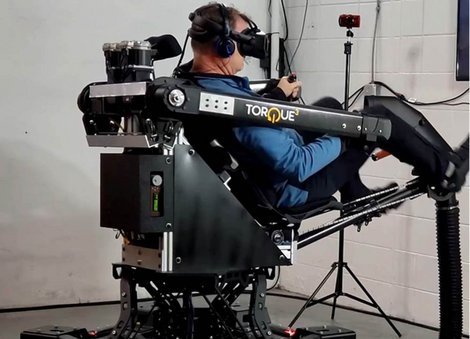Coronavirus Gives Digital Healthcare New Momentum

Startup Torque3 in San José, California and Sachsenring Bike Manufaktur in Sangerhausen are tinkering with a bicycle – for neurorehabilitation
Long before Covid-19 broke out, nursing research scientist Patrick Jahn was arguing for digital healthcare to be championed rather than demonized: “In rural areas especially, mobile care would make things so much easier for professional and family carers as well as for the people who need that care.” Jahn and like-minded scientists and businesses formed an alliance called “Translationsregion für digitale Gesundheitsversorgung” (the Region for Digital Healthcare Transformation) – TDG for short, which is bringing innovative solutions to rural areas.
“We’re focusing on digital aids that help people stay independent in their familiar home environment even at an advanced age. And we’re developing solutions for a digital infrastructure to guarantee high-quality health- and outpatient care, especially in rural areas,” says Patrick Jahn. As a trained nurse with a Ph.D. in Nursing Science, he knows exactly what he’s talking about. Last July, the 44-year-old was appointed to the Head of Nursing Research at Martin Luther University Halle-Wittenberg.
“Around 25% of the population in Saxony-Anhalt is over 65. By 2030 it will be 30%,” says Jahn, adding that this demographic trend is also spawning new business segments. The acute impact of the Covid-19 crisis has made the need for digital solutions blatantly obvious, he says, in the full knowledge that the digital world is a difficult, alien concept in the eyes of most private households and care facilities. That’s what he’s working on with his 70-plus TDG partners, including universities, software firms, housing companies, doctors, care service providers and therapists. One such example is a pilot project called Living Together 4.0, co-run with local housing company HaNeuer Wohnen. A pioneer in living spaces for seniors, the firm is keen to equip its homes with digital technology that meets their needs. The project includes a user-friendly online portal that quickly connects people looking for help with “spur-of-the-moment” volunteers in their neighborhood.
Telepresence robots and tele-speech therapy
Patrick Jahn sees the coronavirus crisis as an opportunity to gain faster acceptance and implementation for digital offerings like telecare, which are taking on new significance in terms of online consultations between doctors, professional carers and family caregivers – from instructions on how to change a dressing to accessing speech therapy exercises. Jahn is exploring the use of telepresence robots. The first models at Halle University Hospital are extremely promising. The mobile VoIP (Voice over Internet Protocol) system, which is controlled by a doctor or nurse, makes everyone involved in the conversation feel like they’re in the same room. “People are now keen to try out these aids for outpatient care and nursing” says Jahn.
Another project, involving Martin Luther University Halle-Wittenberg, Pixelmad Studios UG in Magdeburg and the UHK Speech Therapy School in Halle amongst others, aims to provide aphasia patients – who have generally suffered a stroke – with speech therapy in their own homes. The innovation uses AI-based assessment and exercise planning. “A digital tele-speech therapy room that can be used by individuals or groups would give patients with reduced mobility in rural areas access to very effective aftercare,” says Jahn. The talented young team at Magdeburg’s Pixelmad Studios is working on 3D visualization as well as game and software development.
Neurorehabilitation by bike
The therapeutic application of “exergaming” – computer games that require people to react and move parts of their body – is another field that nursing researcher Patrick Jahn is passionate about. As a co-founder of the Saxony-Anhalt Stroke Alliance (SASA), he’s interested in using this type of innovation to aid neurorehabilitation after a stroke, with a view to helping patients lead an active, independent life. This particular collaboration goes all the way to San Jose in California, where Start-up Torque3 is developing a platform for simulation technologies. It resembles a stationary recumbent bike and simulates a realistic cycling experience for the user – from pushing against the pedals to highly accurate steering feedback and even the feel of the air rushing by.
Sachsenring Bike Manufaktur GmbH (SBM) in Sangerhausen sees a whole new business area in offering stroke patients VR-assisted rehabilitation at home. The company is over 100 years old, with a Saxony-Anhalt heritage as one of the biggest bicycle production sites in Europe as well as extensive expertise in sensors and electric drive solutions. SBM and Torque3 plan to co-develop and build an innovative training device the likes of which we’ve never seen before. Jahn sees this project as a sustainable example of how digitalization can even be used preventively to help reduce care dependency.
Author: Kathrain Graubaum
